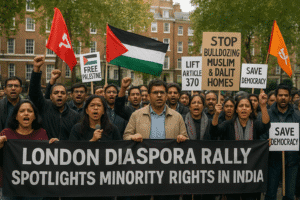Beyond Borders: London Diaspora Rally Spotlights Minority Rights in India
South Asian diaspora groups rallied in London’s Gordon Square on August 16th, protesting the persecution of minorities in India. Demonstrators condemned the targeting of Bengali Muslims, citing reports of detention, torture, home demolitions, and threatened deportation despite their citizenship, effectively criminalizing their identity. The protest strongly denounced the 2019 revocation of Article 370 in Jammu and Kashmir, framing it as an act of “illegal occupation.”
Activists also voiced solidarity with Indian Dalits and Christians, criticizing the Modi government’s Hindutva policies, alleged efforts to undermine the constitution, and the bulldozing of minority homes. Explicitly linking struggles, participants expressed joint solidarity with the people of Gaza, chanting for a “Free Palestine.” Organizers emphasized that histories of oppression are interconnected, urging unified resistance against chauvinism to uphold humanity. The event underscored deep diaspora concerns over India’s secular identity and the urgent need to protect vulnerable communities.

Beyond Borders: London Diaspora Rally Spotlights Minority Rights in India
The crisp London air around Gordon Square resonated with chants and songs of resistance on August 16th, as a coalition of South Asian diaspora groups staged a powerful demonstration. Their focus: escalating concerns over the persecution of minorities in India, with particular emphasis on the plight of Bengali Muslims and the enduring fallout from the revocation of Article 370 in Jammu and Kashmir.
Organized by groups including the South Asia Solidarity Group, the protest drew dozens of activists who transformed the square into a platform for urgent testimony. Through impassioned speeches, poetry, and songs, they painted a stark picture of the situation unfolding thousands of miles away.
Central to their outcry was the treatment of Bengali Muslims in India. “Despite possessing Indian citizenship,” organizers stated, “Bengali Muslims face systematic targeting: arbitrary detention, torture, the demolition of their homes, and even threatened deportation to Bangladesh. Entire communities are effectively being criminalized solely based on their linguistic and ethnic identity.”
The 2019 revocation of Article 370, which granted special autonomous status to Jammu and Kashmir, was condemned as an act cementing “illegal occupation” and further disenfranchising the region’s people. Protesters linked this move to a broader pattern of policies under the Modi government, driven by what they termed a majoritarian “Hindutva” ideology.
This pattern, they argued, extends beyond Kashmir and Bengali Muslims: Dalits and Christians also face increasing discrimination and violence. Protesters specifically denounced the use of bulldozers to demolish Muslim and Dalit homes and raised alarms about alleged efforts to replace India’s secular constitution with the Brahmanical “Manusmriti,” an ancient text known for its rigid and discriminatory caste hierarchy.
The gathering transcended single-issue activism. In a poignant moment of intersectional solidarity, participants forcefully linked their struggles to the ongoing crisis in Gaza. “Let this gathering be a reminder,” declared the South Asia Solidarity Group, “our histories are intertwined, our oppressions connected, and so must our struggles be. We must never allow chauvinism to triumph over humanity.” Chants for a “Free Palestine” mingled with those demanding justice for minorities in India.
Why This Matters Beyond the Square:
This London protest underscores a critical reality: concerns about minority rights in India resonate powerfully within its global diaspora. These communities, often holding deep cultural ties and family connections, act as transnational witnesses, amplifying voices they fear are being suppressed domestically. Their protest is not just about specific policies; it’s a fundamental plea for the preservation of India’s secular, pluralistic identity and the protection of vulnerable citizens against state-enabled discrimination. The explicit connection drawn to Gaza highlights a growing global narrative framing these struggles within a wider context of resisting majoritarian oppression and upholding universal human rights. The diaspora’s message is clear: the world cannot afford to look away.
You must be logged in to post a comment.